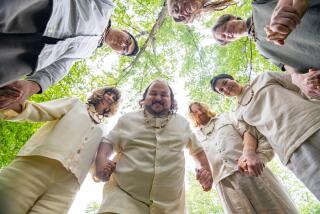James Corden, ‘One Man’ and a plethora of talent
NEW YORK — James Corden is in the throes of a New York moment. He’s in a hit Broadway show, the London import “One Man, Two Guvnors,” and though he’s been down this road before with “The History Boys,” a more high-minded British comedy that became a smash on the Great White Way, this time he’s the star and all eyes are on this generously proportioned funnyman — a cherub posing as Puck, or is it the other way around?
Part of the secret of Corden’s comic gift is that he combines innocence so naturally with mischief. Although he’s 33, his face is that of an adolescent boy who has just discovered beer, Internet porn and some new flavor of potato chip.
Throughout Richard Bean’s Benny Hill-ified treatment of Carlo Goldoni’s commedia dell’arte masterwork “The Servant of Two Masters,” Corden lets us see the glint of lust in Francis’ eye as a piping hot plate of food or perfumed beauty passes his way. Like Oscar Wilde, the character can resist anything except temptation, and Corden seems more than happy to follow his every gluttonous whim.
His schedule crammed to the breaking point, Corden and I are riding in a hired car that’s shuttling us from the CUNY-TV studio — where Corden, Bean and “One Man, Two Guvnors” director Nicholas Hytner had just sat down with Michael Riedel and Susan Haskins of “Theater Talk” — to the temporary New York home near Lincoln Center he shares with his girlfriend, Julia Carey, and 1-year-old son.
It’s the same building in which I interviewed Richard Griffiths when he was starring in “The History Boys.” Although Corden was in that production — he was the chubby boy, a designation that doesn’t seem to bother him in the least — his accommodations weren’t as luxurious. All that has changed now that it’s his name perched above the title.
Recently crowned Broadway’s new king of comedy, Corden can’t stop yawning. He’s rushing home so he can catch a little shut-eye before tonight’s show, one of eight exhausting pratfall-filled performances he delivers each week. But he’s nonetheless wired from all the fanfare for a performance that has some veteran theatergoers invoking comparisons to Zero Mostel and Bert Lahr.
“I’m from the smallest town outside London,” he says. “This really shouldn’t be happening to anyone from my town.”
Mostly, however, he’s relieved that the New York critics were as tickled by the show as their London counterparts. Not everyone was so sure that the humor would survive the transatlantic crossing. Britain and America, after all, are countries separated as much by a common language as by a common punch line.
“Before we came out here I said to friends of mine, ‘We’ll know within an hour whether we’re staying for five months or we’re going home.’ Within an hour, I just thought, ‘Oh, my God. This is, if anything, bigger. This is louder than it was at home.’”
The laughter in the house is certainly the most uproarious I’ve heard in the theater since Nathan Lane and Matthew Broderick were volleying Mel Brooks’ shtick back and forth in “The Producers.” There’s one bit in which Corden wrestles (unsuccessfully) to pick up a giant trunk that, to go by the violent guffawing of grown men around me, seems more hernia-inducing for the audience than it is for Francis. Who knew respectable, well-heeled theatergoers of a certain age could be so riotous?
Corden has all the makings of a great clown. Everything about him is outsized, yet he’s as light on his toes as any dancer. The conspiratorial smile that curves along his fleshy Everyman face extends an invitation for others to let their ids hang out along with his.
Perhaps the most striking feature of his comedy is that he never appears to be doing a routine. No matter how ludicrous the situation, he views the action from the heart and mind of his character. Gags, even the one that involves a wrestling match with himself, are humanized. And he handles the audience participation bits (how much of which are scripted is a question he won’t answer) with all the cheeky self-assurance of a seasoned stand-up comic.
“I don’t consider myself a comedian,” he says matter of factly. “I consider myself an actor who presently is in a comedy. Comedy is clearly something I enjoy hugely, but by the same token, there are other things I feel I’m capable of and would like to do.”
Corden has done quite a lot already, and though at the moment he can still walk the streets of New York without too much attention, in Britain he’s a huge star, thanks largely to the BBC sitcom “Gavin & Stacey,” which he co-wrote with fellow actor Ruth Jones, who, like him, had a key sidekick role. (The series ended in 2010, but Corden says that the cast may return for specials.)
Hollywood can always use an ace funnyman like Corden, and the actor admits to being “a big fan of Los Angeles.” (“There’s a mass of cool, cool Brits who go, ‘I can’t bear it.’ Well, don’t go then. Shut up. Stop going and hanging out there for six months. Do you know what I mean?”) But he’s not so starry-eyed to lose focus on the thing that counts — the material.
“The question isn’t film, TV or theater,” he says. “You just want to do things that are good. I would rather be in a great play than a bad film. I’d rather be in a great TV series than a bad play. The truth is you never know if something’s going to be good or not. The point should not be whether it’s shot on film or shot on tape or if it’s on a stage. Mostly, it’s about the people you want to work with. That’s the thing for me. I’m more attracted to working with people than the genre in which it takes place or the medium in which it takes place.”
Corden names Philip Seymour Hoffman (“as good an actor as there is alive at the moment”), Jack Black (“I love him. I’ve never met a more encouraging and brilliant soul ever. I think he should have won an Academy Award for what he did in ‘School of Rock.’”) and Jonah Hill (“He’s made these big comedy films and you watch him in ‘Moneyball’ and he’s terrific”) as performers he identifies with. Talent is the common denominator, but so too is size. Corden says he doesn’t feel defined by his weight (“I don’t think my career will be any more hampered by the fact that I’m heavy than by the fact Brad Pitt is attractive”), but it’s clearly a consideration.
He’s actually slimmed since I first saw “One Man, Two Guvnors” at The National Theatre of Great Britain last summer. He says he’s been on a strict diet, and though he’s still round, his girth no longer sets off medical alarm bells. The show, he’s pleased to report, is just as funny, so he has none of those fears that oversized opera divas have about becoming too svelte and losing their magic.
Aren’t comic actors supposed to have a scary dark side? Corden seems as straightforwardly normal as the guy who sat next to you in homeroom for four years.
“I have no pain to sell,” he says. “I grew up with my father who’s a Christian book salesman and my mum’s a social worker. I’ve been happy my whole life. We all have moments, but it would be so ridiculous of me to complain. Any problems I have are so irrelevant in the grand scheme of things.”
He does admit to a period of self-doubt, however. It was after Alan Bennett’s play “The History Boys” had become a hit in London and his fellow cast members and drinking buddies were coming in with loads of scripts.
“They were all being seen for films and TV shows,” he says. “I wouldn’t get the whole script. I would just get three pages, and the part they would want to see me for is the guy who drops off the TV to Hugh Grant in a film. It can be quite saddening. I felt like I was being told, ‘No, no, this is what you do. These are the parts you play. This is what stars look like, and you are not welcome to our group right now.’ So I thought, ‘Well, then I have to do something myself.’ I was lucky enough that I had a great friend and writer and actress in Ruth Jones. We wrote ‘Gavin & Stacey,’ and it changed both of our lives.”
His personal life has certainly changed since he was running wild with his fellow History Boys in London and New York. “We all knew that was an absolute once-in-a-lifetime thing. It was like going to college or university, but with money,” he says with a grin that should get him immediately cast in an “Animal House” remake.
His girlfriend (whom he’s marrying after he leaves the show in September) and son aren’t at home when we arrive at the apartment, but his son’s toys are scattered all over the floor. Corden beams at the massive sprawl of figurines. Having his family around him, he says, has made his work infinitely more enjoyable.
“You just get to switch off from it all,” he explains. “Having time to switch off from work means that when you go back to work, you’re immediately fresher and more excited about starting again. Whereas if I did the show, went out and had loads of drinks and then came back and thought about the show and thought about how I could improve it and fell asleep, woke up, and thought about more things it would just become a bit of a mess.”
Slapstick requires that he pace himself. Right now he’s managing a host of niggling injuries, from a cartilage tear in his knee to a scratched eyeball that occurred during a tech rehearsal. As he prudently observes, “You can’t throw yourself backward over a chair eight times a week and not just catch yourself once is the truth.”
Fortunately, laughter is the best medicine, and at the moment no one on the New York stage is writing a bigger prescription.
More to Read
The biggest entertainment stories
Get our big stories about Hollywood, film, television, music, arts, culture and more right in your inbox as soon as they publish.
You may occasionally receive promotional content from the Los Angeles Times.











